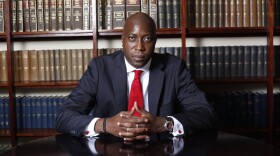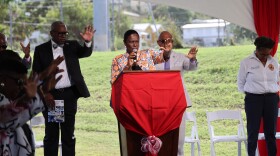ST. CROIX — A federal judge is requiring the two defense attorneys in the woodpile fraud case against Davidson and Sasha Charlemagne to submit the questions they plan on asking the witness in a criminal deposition and the reasons their inquiries should be allowed.
Senior District Judge Wilma Lewis is also requiring the prosecution to review those questions and indicate if they are unacceptable and why.
“What I want is to know which areas are in dispute,” Lewis said at the conclusion of a five-and-a-half-hour hearing Thursday in District Court.
Lewis is requiring the defense attorneys to submit their filings Friday. The government has one week to respond. All filings will be under seal.
The prosecution requested the hearing prior to proceeding further with the deposition of Morris Anselmi, a government witness who lives in Texas and co-owns Island Services Group, which is connected to the case against the Charlemagnes, who appeared in court for the hearing.
The government argued in a motion that the hearing was needed for the court to resolve the issue on whether questions asked during cross-examination about Anselmi’s separate and unrelated criminal matter are authorized or prohibited under the Federal Rules of Evidence regarding impeachment in order to move forward with the deposition.
Anselmi’s deposition, which remains ongoing, has already been held on April 8 and 28. Anselmi’s poor health is preventing him from being called as a witness during the Charlemagnes’ trial, so the responses he gives to questions during his deposition are expected to be admitted at trial. The government already questioned him. Attorney David Cattie, who represents Davidson Charlemagne, began his cross-examination but has not completed it. Attorney Pamela Colon, who represents Sasha Charlemagne, has not yet begun her cross-examination.
The charges against the married couple, including money laundering conspiracy, stem from a two-year investigation involving a three-year, $4.4 million contract with the Virgin Islands Housing Finance Authority for storage and management of lumber the Federal Emergency Management Agency shipped to the territory to rebuild damaged houses and buildings following the 2017 hurricanes. Davidson Charlemagne, who owns D&S Trucking, allegedly proposed for Island Services Group to submit a bid to manage the lumber, with D&S Trucking serving as the subcontractor.
Anselmi and ISG co-owner Kimberly McCollum were both indicted in a separate case for allegedly stealing $500,000 in coronavirus relief funds through the Paycheck Protection Program.
Cattie questioned Anselmi during his deposition on April 8 about the allegations against him as well as his cooperation with the government. When Cattie asked Anselmi if he had discussions with the government about his cooperation against Davidson Charlemagne in exchange for benefits in his pending PPP fraud case, Anselmi replied, “only the immunity.”
Assistant U.S. Attorney Denise George said during the hearing that the defense wants to ask certain questions that Anselmi’s attorneys — Scot McChain and Annabelle Nadler — feel are improper. She said the government requested the hearing so the court can determine if such questions are appropriate. She said asking questions about Anselmi’s criminal charges in the PPP case forces him to give responses that imply guilt, suggesting there should be a limit regarding the types of questions he can be asked during cross-examination. She said the immunity agreement between Anselmi and the government only covers questions relating to his involvement in connection to the Charlemagnes’ case.
“There was never intention between the parties for it to include the PPP case,” she said.
Cattie disagreed with the prosecutor, noting the language in the immunity agreement is clear.
“There’s no language in the agreement that limits it to this case,” he said, adding that he’s only asking to do effective cross-examination.
Cattie suggested the court could make a ruling on the immunity issue to clarify that it covers him in any case. He said he wants to question Anselmi to show that he hopes to get benefits in his PPP case in exchange for his testimony against the Charlemagnes.
“I need to show the jury he has some reason to lie about whatever harmful testimony he gives,” he said.
McChain and Nadler submitted an emergency motion the court granted that allowed their client, Anselmi, to intervene in the Charlemagnes’ case for the limited purpose of appearing at Thursday’s hearing to address matters regarding the protection of his constitutional rights during his deposition. Nadler, a Miami-based attorney who participated virtually, said questions about Anselmi’s PPP case would be inappropriate.
“He can’t be asked questions that will lead to his own incrimination in an unrelated case for which he has no immunity for,” Nadler said.
Colon said Anselmi’s responses during his deposition are being treated as trial testimony. She agreed with Cattie that Anselmi’s immunity agreement prevents him from being prosecuted in any criminal case.
Lewis said her thought process is that the answers Anselmi gives during his deposition cannot be used against him in any criminal matter, including his PPP case. She said bias and questions relating to Anselmi’s credibility are fair game, so his responses cannot be used against him in other matters.
As the Charlemagnes’ case moves forward, George indicated during a calendar call held Thursday before Magistrate Judge Emile Henderson III that the government needs an additional 60 days to obtain and review bank records and electronic documents.
A calendar call is scheduled for 9 a.m. July 15.















